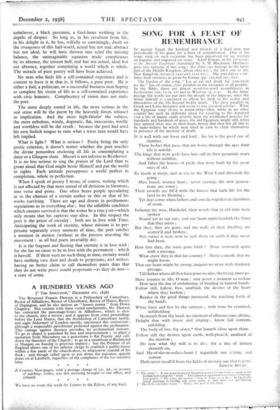SONG FOR A FEAST OF REMEMBRANCE
IN ancient Egypt the kindred and friends of a dead man met periodically at his grave for a feast of remembrance. One of the songs sung on such occasions has been preserved for us, written on papyrus and engraved on stone. Adolf Erman, in his Literature of the Ancient Egyptians (translated by A. M. Blackman, Methuen) gives two versions of this song ; the older one belongs to the latter part of the Middle Kingdom (about illoo E.c.), the later one to the New Kingdom (between 1550 and 1233 B.C.). My translation com- bines both versions, as given by Erman (pp. 133 and 251, 252).
The burden of the song, " Let us eat and drink for tomorrow we die " has, of course, close parallels in the literature of all peoples. In the Bible, there are almost word-for-word resemblances in
Ecclesiastes (viii, is-ix, io) and in Wisdom (ii, 1-9). In the latter passage the words are put into the mouth of the impious, since the writer himself is concerned to affirm his faith in the reality and blessedness of the life beyond bodily death. The close parallels in Greek and Latin literature will occur to any classical scholar. What the Egyptian song shows is noteworthy—that, while in no other country has such an elaborate ritual for insuring to the departed soul a life of happy sunlit activity been the established practice for hundreds and hundreds of years, the old Egyptians might still, when they uttered what was in their heart, betray that they felt all this to be make-believe by which men tried in vain to cheat themselves ih presence of the mystery of death.
IT is well with our lover and lord : his lot is the good one of
slumber.
These bodies that pass, that are born, through the ages their tale is untold. • The kings that were gods have lain still in their pyramids years without number, And fallen the houses of pride that were built by the great ones of old.
Ra riseth at morn, and at eve to the West Land directeth his going : Men breed, women bear ; never ceasing, the new genera- tions are sown ; Their nostrils are fill'd with the breeze that hath life for the land in its blowing ; Yet days come when fathers and sons lie together in chambers of stone.
Imhotep the wise, Hardedef, their words that in old time were spoken Sound yet in our ears, and our heart apprehendeth the thing that they mean ; But they, they are gone, and the walls of their dwelling are scatter'd and broken ; Not vainer it were now to seek them on earth if they never had been.
How fare they, the souls gone forth ? None returneth again with a message.
What crave they in that far country ? None cometh, that we might know, That our heart might be strong, unquiet no more with shadowy presage, Till thither where all they have gone we also, the living, must go. Have joyance in life, 0 man : stay never a moment to reckon How near the day of embalming, of binding in funeral bands. Follow still, follow, free, unafraid, the desires of thy heart
where they beckon ;
Rejoice in thy good things increased, the reaching forth of thy hands.
White linen and fine be thy raiment ; with lotus be crowned, withholding
No myrrh from thy head, no ointment of effluence rare, divine, Delight thee with music and singing ; know full content, enfolding The body of her, thy sister,* that leaneth close upon thine. Follow still thy desires upon earth, well-pleas'd, unafraid, of the morrow ; Do now what thy will is to do ; for a day of lament draweth on, And He-of-the-moveless-heart t regardeth not c-ying, and sorrow Hath never recall'd from the fields of eternity one that is gone.
EDWYN BEVAN.
"Thy sister": It was usual in ancient Egyptian poetry for the lover to speak of the woman he loved ashis " sister:' Thissprricl,as a poetical convention, to Hebrew love-poetry (" My sister, my spouse," Song of Songs, iv. 9, &c.). In Egypt, the actual marriage of brother and sister seems to have been not uncommon. f " He-of-th:-moveless-heart " ; Osiris, the god of the dead.


























































 Previous page
Previous page